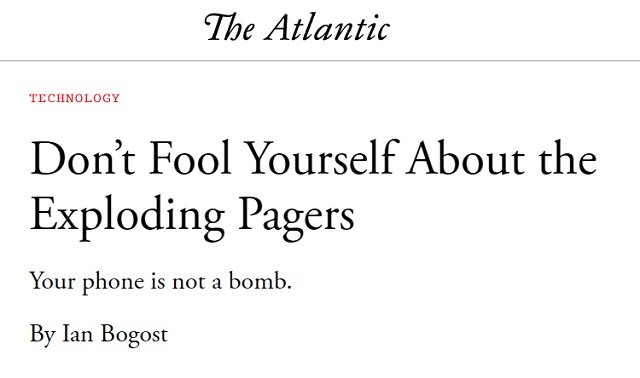The Atlantic: Don't Worry About Israel Putting a Bomb in Your PhoneChris MenahanInformationLiberation Sep. 19, 2024 |
Popular 
NYT: Trump Ended War With Houthis After They Shot Down U.S. Drones, Nearly Hit Fighter Jets

Trump Advisor to Washington Post: 'In MAGA, We Are Not Bibi Fans'

Ben Shapiro, Mark Levin and Laura Loomer Warn of Foreign Influence... From Qatar

Trump Cut Off Contact With Netanyahu Over 'Manipulation' Concerns, Israeli Reporter Claims

Trump Praises Houthis' 'Bravery'
  Israel inserting explosives into consumer goods which they can remotely detonate at any time is nothing to worry about, so says The Atlantic. Israel inserting explosives into consumer goods which they can remotely detonate at any time is nothing to worry about, so says The Atlantic.Editor-in-Chief Jeffrey Goldberg published an article by Ian Bogost on Wednesday titled "Don't fool yourself about the exploding pagers," with the subheadline "Your phone is not a bomb." Excerpt from The Atlantic (Archive): Yesterday, pagers used by Hezbollah operatives exploded simultaneously in Lebanon and Syria, killing at least a dozen people and injuring thousands. Today brought another mass detonation in Lebanon, this time involving walkie-talkies. The attacks are gruesome and shocking. An expert told the Associated Press that the pagers received a message that caused them to vibrate in a way that required someone to press buttons to stop it. That action appears to have triggered the explosion. At a funeral in Beirut, a loudspeaker reportedly called for people to turn off their phones, illustrating a fear that any device could actually be a bomb, including the one in your pocket.Because some cheap Chinese batteries blow up we should just ignore the uniquely dangerous Unabomber-esque threat posed by Israel planting explosives in consumer goods. Hilariously, the article goes on to claim it's the Chinese and their malware that we should be worried about! Accidental battery fires, even from poorly made parts, couldn’t be used to carry out a simultaneous explosive attack. But that doesn’t mean you don’t own devices that could put you at risk. Consider spyware and malware, a concern commonly directed at Chinese-made gadgets. If connected to the internet, a device can convey messages, send your personal information abroad, or, in theory, detonate on command if it were built (or retrofitted) to do so. It feels plausible enough to put the pieces together in a way that produces fear—exploding pagers in Beirut, wide ownership of personal electronics, lithium-ion fire risk, devices connected to unknown servers far away. Words such as spyware and malware evoke the James Bond–inspired idea that a hacker at a computer half a world away can press buttons quickly and cause anyone’s phone to blow up. But even after the astonishing attack carried out in Lebanon, such a scenario remains fiction, and not fact.The obvious response to this unprecedented attack on not only Lebanon but the global supply chain is to assume any goods connected to Israel are already rigged with explosives and ban their importation worldwide. Israel's unhinged actions have made the Boycott, Divestment, Sanctions (BDS) movement an imperative for public safety. Follow InformationLiberation on Twitter, Facebook, Gab, Minds and Telegram. |



